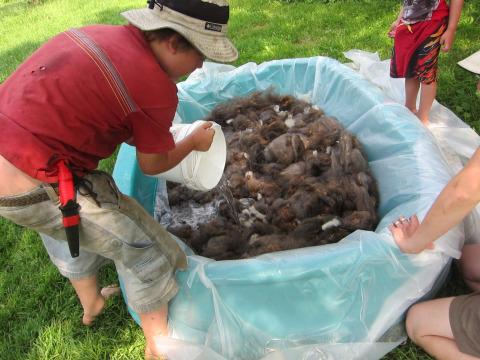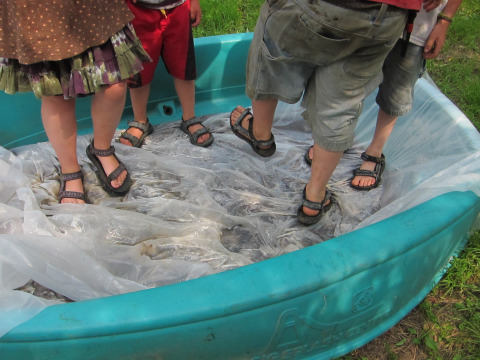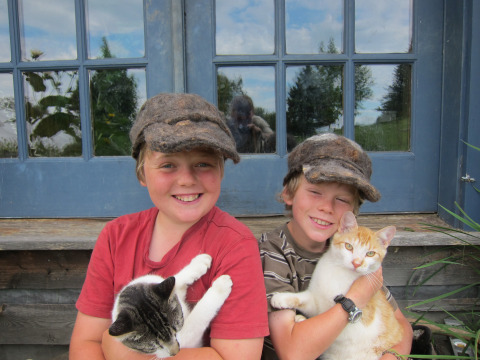What Then?

Step one
From yesterday’s comments:
I’d love Ben’s and anyone else’s thoughts on how to control the “But, what if it’s not the right path?” nagging thoughts. I’m very interested in unschooling, but worry because my child (she’s only 4, so I’m trying to keep some perspective) will opt to just watch movies for hours on end when allowed to make her own decisions. How do you handle those fears?
And, not at all unrelated:
… we live in an environment that doesn’t want us to trust ourselves or our children for that matter.
I’d love to say that Penny and I have all this figured out, that we never feel conflicted or uncertain about the path we’ve chosen. But that would be a lie. What is true, is that the further we explore the path of self-directed learning, and the deeper our commitment becomes, the more aware we are of its benefits, and the less we fear that Fin and Rye are somehow not going to learn what they need to learn to lead meaningful lives as defined by them.

Step Two
I am fascinated by the issue of trust, both as it pertains to our children – not necessarily trusting them, but trusting in them – and as it pertains to us. We live in a world full of experts, and we rely on them heavily. They tell us what to eat, how to educate our children, which medications we should be taking, and even what to wear. It is as if, having been bludgeoned by the overwhelming choice of the 21st century marketplace and the confusion inherent to such choice, we have lost confidence in our own abilities to decide these things for ourselves.
Of course, this is not to say that expert opinion is never correct, nor that there is no place for expertise. But as we become more reliant on specialists to guide us through very personal decisions, I think we risk the erosion of intuition and discernment. I also think it behooves us to consider the backdrop against which most expert opinion is formed. And when it comes to education, it is generally formed with the assumption that our children should be equipped to achieve a particular notion of success relating to college admission, career advancement ($$) and all the other presumed benefits of performance in the context of standardized, top-down education.

Step Three
I’m busy as all heck, so I’ll stop there and simply crib from my upcoming book (see below). But first, I feel compelled to address Jen’s recent comment:
The message I get from your blog is that there is only one way to do a particular thing (your way).
My intention for this space is to share my thoughts and my opinions – many of which are very strong and run counter to conventional so-called wisdom – as they are formed by my family’s experiences on this piece of land. As I pointed out to Jen, this is http://www.benhewitt.net, not http://www.allpossibleviewsexperiencesandopinions.net. Furthermore, it is not my desire to simply recount our days, but to encourage reflection and critical thinking, whether you agree or disagree with what I have to say. If it’s the latter, I am more than open to respectful discussion.
I don’t mean to sound defensive, but I’ve picked up a lot of new readers recently, and it’s important to me that this stuff is crystal clear.
Thank you, and carry on.
Addition, subtraction, writing, reading: All of these and more are necessary for a child – not to mention, an adult – to communicate with his family and community. But the truth is that they can be learned with surprisingly little effort, and in a surprisingly scant amount of time, and always in the context of a child’s true interests and passions.
We have spent very little time teaching this information to Fin and Rye; indeed, we have found that they learn and retain it best when they are allowed to do so at their own behest. In other words, these lessons never happen as abstractions, but only as the logical outgrowth of their curiosity in other matters: To read a book to themselves, to determine the financial prospects of raising a flock of turkeys for the Thanksgiving market, or to write letters to friends and relatives. Recently, they spent three weeks preparing for Vermont’s hunter safety certification course; for hours each day they painstakingly completed the necessary paperwork, and it was as fine a lesson in reading, writing, and penmanship as anything Penny and I – or anyone else, for that matter – could have given them. Having witnessed this time and again, I am struck by just how much of our children’s time we waste on rote learning in isolation from other knowledge and experience. Even as I write these words, I can feel the frustration and even anger I knew as teen, the sense of my time being stolen from me just so I could meet someone else’s expectations of how and what I should learn. I am struck by how disrespectful this is, and how it cannot help but teach our children that their destiny is not in their hands.
Does this self-directed approach sometimes mean that my boys do not “perform” to the standards set by contemporary educational assumptions? As a matter of fact, it does. For instance, Fin did not learn to read until he was nearly nine, and Rye seems to be on a similar track. Quite clearly, there are things that many of their peers know – some of whom attend school, some of whom don’t – that my boys don’t know. Or don’t yet know, anyway. Because I have seen that if I can let go of my fear and simply trust in them, they will learn these things, and they will do it happily, without anger or frustration or the sense that their lives belong to someone else.
Of course there also is knowledge and experience contained in the vessels of my young sons that eludes the vast majority of their peers. That eludes the vast majority of adults, even. I see the way they move through the forest, stopping to pluck a handful of woods sorrel or chanterelle mushrooms, or to point out the scratch marks of a wild turkey or, in the winter, to stoop at a melted divot in the snow, sniff at it, and proclaim it the urine of a red fox. Everywhere, I see the evidence of their knowledge and learning: The multitudinous structures they’ve built, some of evident purpose and careful design, and some that appear purposeless.
You might ask, what is the point of knowing these things? To which I can only answer, what is the point of knowing anything? By extension, we might both ask, what is the point of an education? Is it to be socialized to a particular set of expectations? Is to be granted membership into the prevailing economic model and the assumption that one’s happiness and security is best provided by this economic model? Is it to continue sawing at the few frayed strands still connecting us and the natural world? If so, than perhaps you are correct: There is no point to my sons know what fox pee smells like, or which of the wild mushrooms in our forest are edible, or how to make fire from sticks. There is no point to the ease and comfort with which they move through the wilderness. There is no point to their desire to help our neighbor get his hay under cover before the rain comes. There is no point to their boundless curiosity regarding the habits of the woodland animals. There is no point to all the little shelters and tools they’ve built. There is no point to any knowledge but that which will vault them ahead of their contemporaries in the race to secure their place at the top of the economic ladder.
But what if, as I suggested at the outset of this book, the point of an education is not to teach our children to assume their place at the top of that ladder, but instead to surrender it? What if the point simply cannot be found or measured in the context of performance-based assessments, standardized tests, or projected lifetime income? What if the point of an education is to imbue our children with a sense of their connectivity, and not merely with other humans, but with the trees and animals and soil and moon and sky? What if the point of life is to feel these connections, and all the emotions they give rise to?
What then?
By the way, if anyone’s interesting in reading more about self-directed learning, I highly recommend Peter Gray’s book Free to Learn.

Hats! (and cats)

Ben Hewitt's Blog
- Ben Hewitt's profile
- 37 followers



